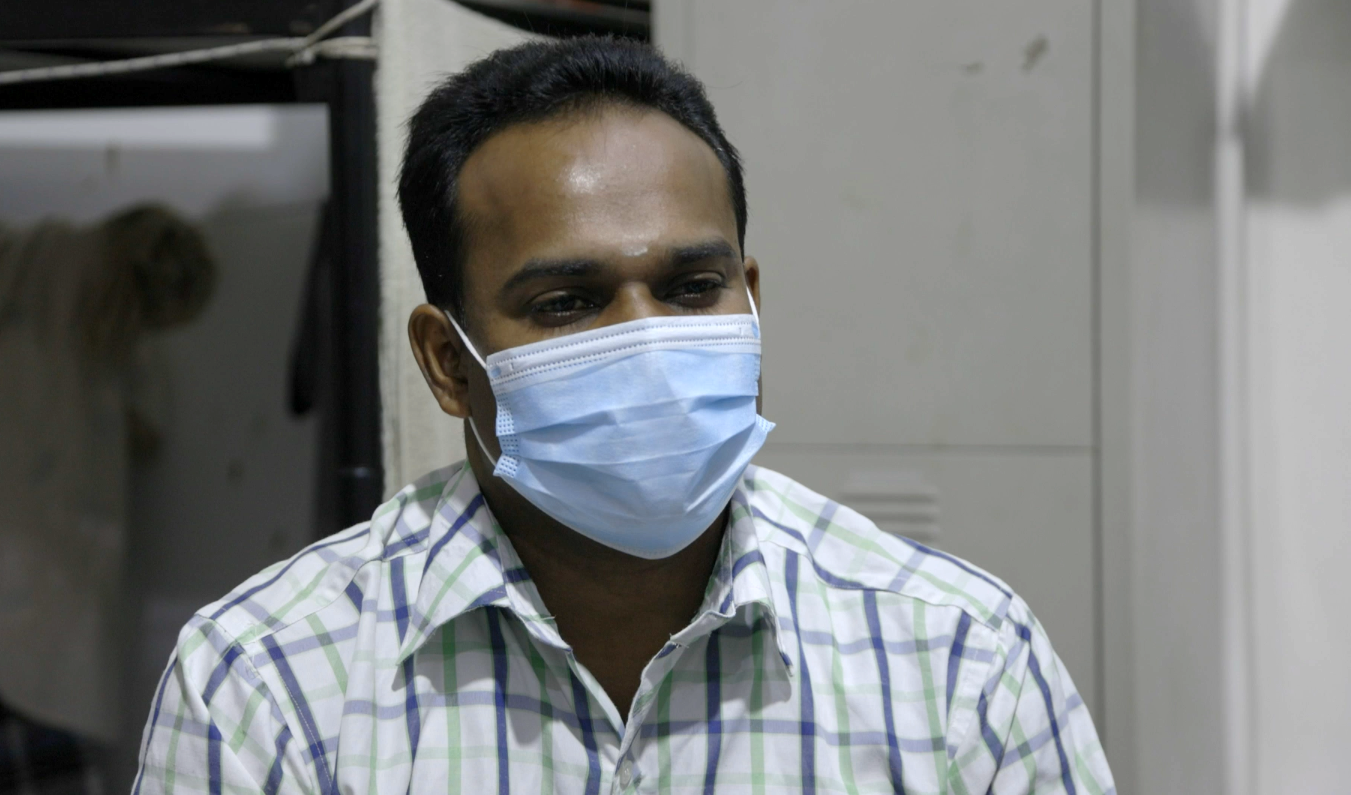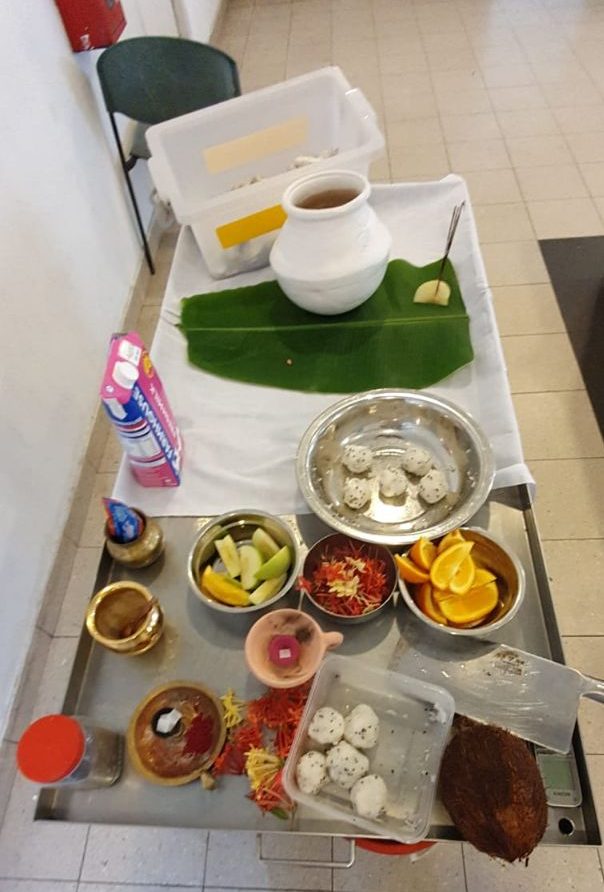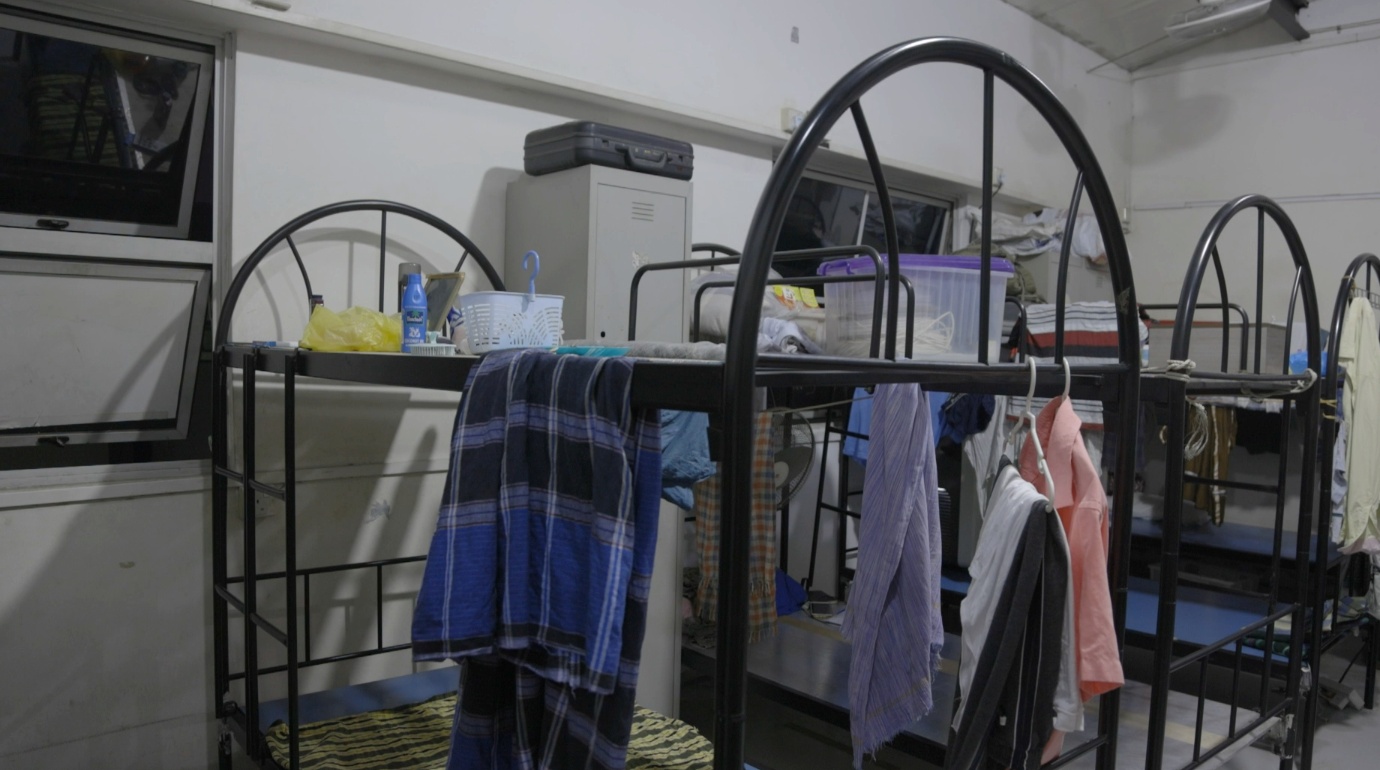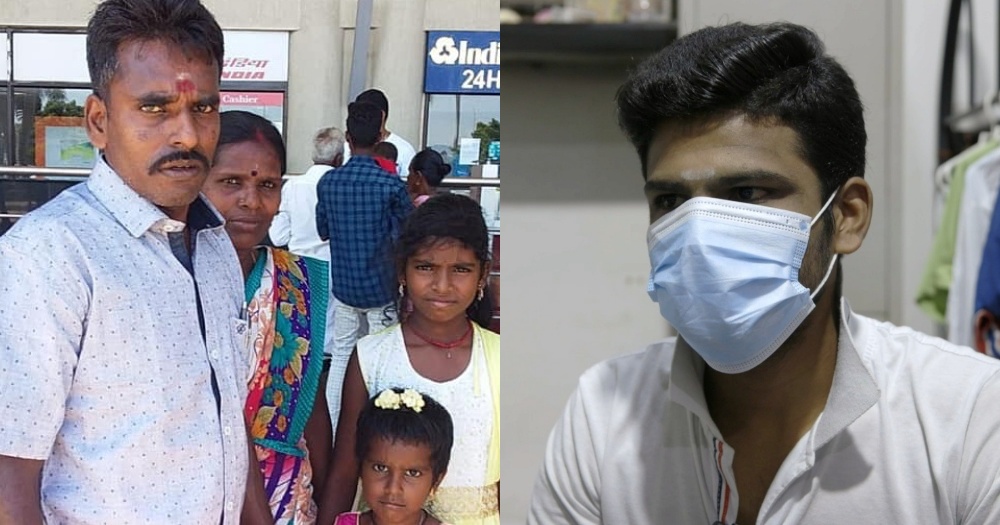Just a minute shy of 7:30am on April 23, Alagu Periyakarrupan was found lying motionless at a staircase landing in Khoo Teck Puat Hospital (KTPH).
The 46-year-old had multiple injuries on his body consistent with those resulting from a fall from height, and succumbed to his injuries on the same day.
April 23 would have been Alagu's fifth day at the hospital, having initially headed in for a chronic stomachache he had been experiencing sporadically over the past year. He wound up testing positive for Covid-19 that day, though, and was warded from the evening of April 19 as Case 8,190.
The Indian national had been working in Singapore as an electrician for the past 11 years.
His sudden death dealt quite a blow to the workers he spent a lot of time with in Singapore — in particular, his 39-year-old colleague and friend Chinnamuthu Saravanan as well as his 23-year-old nephew Veerappan Meenakshi Sundaram.
Speaking to Mothership on Thursday evening in Tamil (through an interpreter), it was clear both men are still shaken by what happened.
Saravanan and Sundaram worked with Alagu in the same company, Multi-Lines Engineering Pte Ltd, and stayed at the same dormitory in Woodlands.
They haven't touched Alagu's bed and belongings in the dormitory; everything has been left exactly the way it was when he left for KTPH to seek treatment for his stomachache on April 19.
That was the last time they saw him alive.
A devout man who enjoyed bee hoon, beer and visiting Hindu temples
Alagu was a man of simple pleasures, according to Saravanan.
He loved Chinese bee hoon and the occasional beer with his friends. He enjoyed cooking with his dormitory mates.
He was also particularly devout, spending his days off visiting Hindu temples like the Sri Veeramakaliamman Temple at Serangoon and the Holy Tree Sri Bala Subramaniam Temple in Yishun.
"Once in a while I would go with him. I don’t go (to the temple) very often," says Saravanan. "He would go to all the temples."
Boss gives advance pay, bonuses, sponsored once-a-year home trips
It was thanks to Saravanan that Alagu first came to Singapore to work more than a decade ago.
He had already been at Multi-Lines Engineering for three years, and told Alagu about how the job offered competitive pay and more importantly, entailed a good boss.
And just how good is their employer? Saravanan says their boss gives advance pay and bonuses, as well as an entire month off every year. All employees also get to go home at least once a year on a trip sponsored by him.
 Saravanan asked Alagu to come to work in Singapore 11 years ago.
Saravanan asked Alagu to come to work in Singapore 11 years ago.
"The fact that he had been working here for 11 years speaks for Alagu's work, and also speaks very much about the employer," says Saravanan.
Alagu, in turn, would go on to recommend his own nephew, Sundaram, when a position at their company opened up in 2018.
Dutiful & diligent, even while confined in the dormitory
That being said, there is no running away from the fact that work is of course stressful, even more so when one is separated from family.
"If you leave and come abroad, there is the anxiety and the stress of being away from the family," says Saravanan.
It's even more unbearable now that they are cooped up in the dorms, adds Sundaram.
"I mean, at least if you have a job, you go out and don't think about the time going by. But now we just sit inside this place, it is a bit difficult."
Despite these challenges they all faced, both men remember Alagu as a very affable colleague who spoke to everyone well.
"He was very steadfast with the work that he did," says Saravanan — Alagu, he testifies, was a dutiful and diligent worker, even when they were all not allowed to leave their dormitories.
"Most of the time he advised me to do my work properly," Sundaram adds, recalling his uncle's constant reminders to him not to betray his trust in recommending him for the job.
 Sundaram remembers his uncle as a steadfast worker.
Sundaram remembers his uncle as a steadfast worker.
Was Alagu happy here? Yes, says Saravanan.
As far as he knew, at least, he was happy with his work and had plans to return to his family in the Andaman Islands after another four years here.
And so it was inexplicable, for those close to him, that he would be gone just like that, all of a sudden.
Called back from hospital to say he had to stay for "a couple of days"
Revisiting Alagu's final days alive, Sundaram and Saravanan say he had called from the hospital on the day he went there to let them know he was going to be warded.
The next day, April 20, Alagu called again to assure his colleagues and boss that he was fine, but added that he had to stay a few more days because the hospital wanted to run some checks.
Sundaram's last conversation with his uncle was just 12 hours before he was found injured at the foot of the hospital stairwell.
On April 22 at around 7:30pm, Alagu called Sundaram to ask how things were at the dorm, and once again reminded him to be a responsible worker.
"Listen to the elders here. You have a lot of responsibilities and you have a brother to take care of in India," he said to his nephew.
Sundaram says he didn't find anything amiss with his uncle's message that night.
But less than 15 hours later, they would learn of his passing.
Shock and loss for family, colleagues
Saravanan and Sundaram's boss broke the distressing news to them at 9am that day.
"It was a shock and also a loss because he was my uncle," says Sundaram.
Later that day around noon, Sundaram — joined by his employer and MOM — broke the news to Alagu's wife in India over the phone.
She was inconsolable and later told the media that she could not believe the news.
Alagu's death came at a time of migrant worker issues being in the spotlight, and online, there was a groundswell of financial support for him and his bereaved family.
Local non-governmental organisation itsrainingraincoats linked up members of the public to Alagu's wife so that they could make donations directly to her.
Alagu's family additionally received S$5,500 from his employer and a small group of anonymous donors.
According to Sundaram, S$1,000 was transferred to Alagu's father on April 27, while the remaining S$4,500 reached Alagu's wife on April 29 after three attempts to remit the money because she initially provided inaccurate bank details.
"That is possibly why (some people) think that the employer had not done anything, which is not true. Because we had the funds. It's just that we couldn't remit."
Body had to be double-bagged, placed in sealed coffin & cremated
Alagu's funeral was held two days after he died, and it was paid for by the Hindu Endowment Board.
Because Alagu was infected with Covid-19, his body had to double-bagged before it was placed in a hermetically sealed coffin, as regulated by NEA.
This also meant that there were some rites that could not be done because there could be no contact with his body.
For those that could be performed, Sundaram did them while wearing gloves and a face mask.
 Rites done during the collection of Alagu's ashes.
Rites done during the collection of Alagu's ashes.
After the cremation, Alagu's ashes were scattered at sea.
A father figure
Meanwhile, back at the dormitory, Alagu's stuff have been left untouched in case the authorities need them, says Sundaram.
Perhaps this — coupled with the fact that they are not allowed to leave their rooms or campus as a whole in general — is why there is an uneasiness in the air, a memory that they cannot move on from, for now.
Then, there are the questions behind Alagu's death. How, why, and where did he fall from?
Sundaram refuses to make guesses at the answers to these questions.
"It's just wrong to speculate on what happened because I wasn't there. I don't know."
 Alagu's items and bed in the dormitory have been left untouched.
Alagu's items and bed in the dormitory have been left untouched.
It's clear that both he and Saravanan miss Alagu terribly, though. When we ask if each of them has anything to say to or in tribute to his memory, Saravanan pauses, then shrugs helplessly.
Sundaram says he will always remember his uncle as a caring father figure.
"When he was around, he was such a father figure to me. He provided advice and gave me opportunities because he advised me even though it's not my field of study, but he kept telling me, 'You came here to work, so learn fast, do your best, and do the right thing'."
Stories of Us is a series about ordinary people in Singapore and the unique ways they’re living their lives. Be it breaking away from conventions, pursuing an atypical passion, or the struggles they are facing, these stories remind us both of our individual uniqueness and our collective humanity.
Quotes were translated from Tamil through an interpreter. Top image via.
If you like what you read, follow us on Facebook, Instagram, Twitter and Telegram to get the latest updates.
